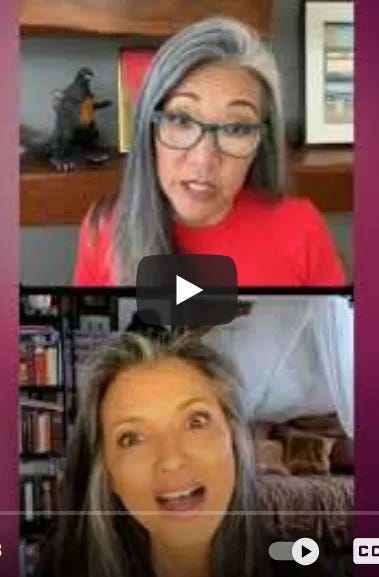I was 47 and had been high-lighting for many years. I loved the way it looked but didn’t like the increasing contrast between my roots and the rest of my hair. So I stepped back and rationally calculated the impact of going gray.
I figured I’d take a hit at that point because I’d look older than my peers, but then in my late 50s and 60s people might say, “She hasn’t aged all that much in the last decade. She looks pretty good!” And then in my 70s, I’d avoid both a sudden transformation of my appearance from dyed to all gray, or a stark contrast between the age of my face and look of my hair if I was still dyeing. I concluded that net-net, I’d look better---amortized over the course of the decades---if I went gray when I did.
I’ve always been a forward thinker.
First anxiously, and then enthusiastically, I became a member of the gray community. Like any converts we Grays can be a bit annoying. You can find lots of self-affirming, almost evangelical, testimonials online by “silver sisters” or “silver ladies” (because silver sounds prettier than gray, and apparently because “foxes” are only male…?) about the freedom they feel, accepting who they really are, embracing their authentic selves, etc. Yes, I felt all of that too. But I was surprised to find that I also thought I looked good with the gray, better than before. I can feel your doubt, but hear me out: Now I stand out for my hair, whereas before my hair was nice but not something you’d write home about.

So I’ve developed a bit of a swagger about my hair. And when I see other women my age who also have a significant amount of gray hair, I feel a magnetic thrill. When we pass each other on the street, there’s a barely perceptible head-nod of recognition and appreciation, a slight How you doin’? à la Joey on Friends.
But my vanity didn’t stop there. I used to be a wash-and-go person. I didn’t even blow dry my hair unless it was a special occasion, and it still eludes me how to blow dry my hair outside of the bending over upside down method. But now I always blow dry my hair after washing it, and I also crimp it with a flat iron so it has some curls, something I never would have done a decade before. Contrary to many who talk about how much time not dyeing saves them, I now take more time tending to my hair than I did before. Looking natural can be a lot of work!

It turns out I’m not alone in this. A study of women who stopped dyeing found that many compensated by investing more time and money into hair styling, cosmetics, and clothing. The reason? They feared looking old or frumpy, with the concurrent judgement that they were “letting themselves go.”
It didn’t shock me to learn that the concern about gray hair being seen as “letting oneself go” is much more acute for women than for men, who are often viewed as distinguished-looking and—-annoyingly!—--even hotter with gray hair (think George Clooney).
Women can find themselves between a rock and a hard place in terms of their hair: We can be judged for trying too hard or not being authentic if we dye our hair, or that we are not trying hard enough if we “let” ourselves go gray.
I recognize that for me there were several reasons that made going grey easier: I have - or had - light-colored hair, so it blended more easily with the gray; I work in academia (not the most fashion-forward of fields); I’m married (dating apps are not known for their acceptance of a wide range of appearances and body types); and I live in Cambridge, MA, which might possibly be the gray-haired capital of the world.
I also recognize that there are real potential costs of going gray: Women who are perceived as older can experience more cultural invisibility, and they can face more workplace discrimination, especially in service professions. There are also certain jobs in the public eye where it is virtually impossible for a woman to have gray hair. (Remember Lisa LaFleur, the TV news correspondent in Canada who let her hair go gray during the pandemic and was fired?)
So there are good reasons that around 50% of women in their 40s and 50s dye their hair, compared to 10% of men. And there are also good reasons why, even though hair may be seen as a trivial matter, women spend more time than they wish contemplating what to do about their graying tresses.
My hope is that with the (gradual) increasing visibility of gray hair, it can be seen as another viable and attractive option. Not an option that is devoid of vanity as my case has shown, since all aesthetic choices carry a degree of vanity even when the look you are going for is “natural.” But I hope gray hair can be seen as a possibility that involves the best of what beauty practices can bring us: pleasure in adorning ourselves, pride in aesthetic expression, and joy in finding our people, silver or otherwise.





1. You look stunning with gray hair. 2. I think the idea of spending more time rather than less is fascinating. It makes me think about how much more work it is to "go natural" with my curls than it is to wear it straight.
You look amazing with gray hair. I wish I felt like I could get away with going gray…unfortunately, in my business area, I don’t think I can. It’s actually quite comforting to hear that the data suggests that going gray wouldn’t reduce the amount of time I spend on my daily beauty routines.